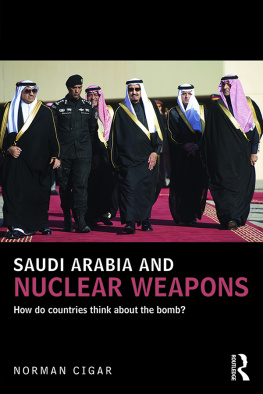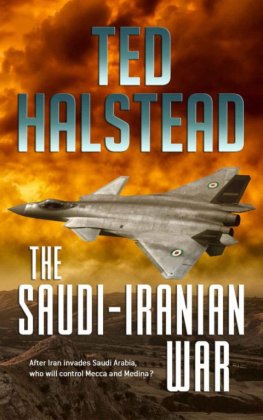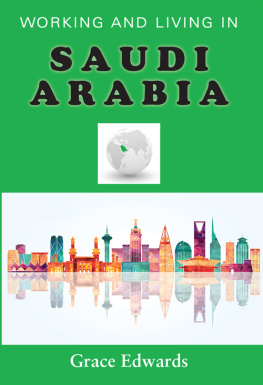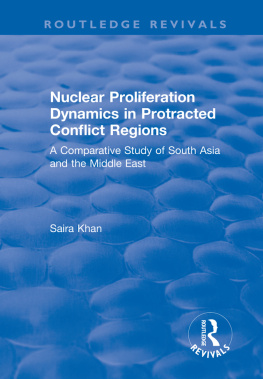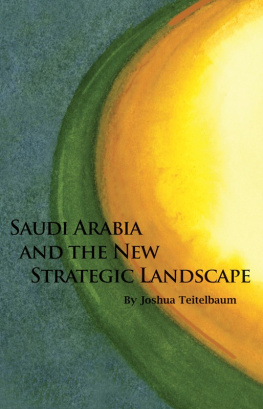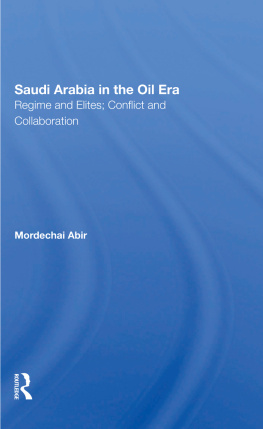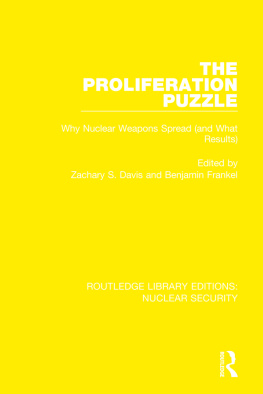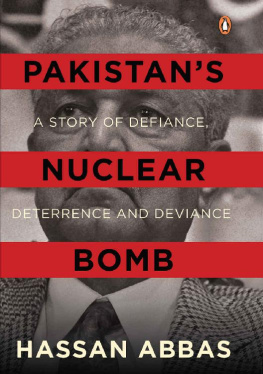SAUDI ARABIA AND NUCLEAR WEAPONS
Nuclear proliferation in the Middle East remains an issue of concern. Saudi Arabias actions will largely rest on Irans decisions, and discussions and preparations within Saudi Arabia would suggest that it is ready to react to potential shifts in the regions nuclear powers.
Saudi Arabia and Nuclear Weapons uses an inside out approach that emphasizes the Saudis own national interests in relation to the nuclear threat, and their understanding of the role of nuclear weapons in defense, foreign policy and the concept of deterrence. It is the first study with comprehensive use of the local Arabic-language military and civilian media to provide this understanding of official thinking and policy. The Saudi case study is contextualized against the prevailing proliferation models, to conclude that the Saudi case shares both commonalities and elements of uniqueness with other proliferation cases, implying the need for a multi-causal approach. Its comparative analysis also suggests potential implications applicable more broadly to the issue of nuclear proliferation.
A comprehensive study of Saudi Arabias attitude to nuclear weapons, this book offers an exploration of nuclear proliferation that will interest students, scholars and policymakers working in Middle East studies, as well as in military and nuclear proliferation studies.
Norman Cigar is a research fellow at the Marine Corps University, from which he retired as Director of Regional Studies. His research focuses on WMD and jihadist warfare in the Middle East, and he is the author of Saddam Husseins Nuclear Vision: An Atomic Shield and Sword for Conquest.
UCLA CENTER FOR MIDDLE EAST DEVELOPMENT (CMED) SERIES
Series Editors
Steven Spiegel, UCLA
Elizabeth Matthews, California State University, San Marcos
The UCLA Center for Middle East Development (CMED) series on Middle East security and cooperation is designed to present a variety of perspectives on a specific topic, such as democracy in the Middle East, dynamics of Israeli-Palestinian relations, Gulf security, and the gender factor in the Middle East. The uniqueness of the series is that the authors write from the viewpoint of a variety of countries so that no matter what the issue, articles appear from many different states, both within and beyond the region. No existing series provides a comparable, multinational collection of authors in each volume. Thus, the series presents a combination of writers from countries who, for political reasons, do not always publish in the same volume. The series features a number of sub-themes under a single heading, covering security, social, political, and economic factors affecting the Middle East.
1. The Struggle over Democracy in the Middle East
Regional politics and external policies
Edited by Nathan J. Brown and Emad El-Din Shahin
2. Women in the Middle East and North Africa
Agents of change
Edited by Fatima Sadiqi and Moha Ennaji
3. The Israel-Palestine Conflict
Parallel discourses
Edited by Elizabeth Matthews
4. Gender and Violence in the Middle East
Edited by Moha Ennaji and Fatima Sadiqi
5. Non-State Actors in the Middle East
Factors for peace and democracy
Galia Golan and Walid Salem
6. Regional Security Dialogue in the Middle East
Changes, challenges and opportunities
Edited by Chen Kane and Egle Murauskaite
7. Israeli Peacemaking Since 1967
Behind the breakthroughs and failure
Galia Golan
8. Justice and Peace in the Israeli-Palestinian Conflict
Yaacov Bar-Siman-Tov
9. The Political Ideology of Ayatollah Khamenei
Out of the mouth of the Supreme Leader of Iran
Yvette Hovsepian-Bearce
10. Saudi Arabia and Nuclear Weapons
How do countries think about the bomb?
Norman Cigar
SAUDI ARABIA AND NUCLEAR WEAPONS
How do countries think about the bomb?
Norman Cigar
First published 2016
by Routledge
2 Park Square, Milton Park, Abingdon, Oxon OX14 4RN
and by Routledge
711 Third Avenue, New York, NY 10017
Routledge is an imprint of the Taylor & Francis Group, an informa business
2016 Norman Cigar
The right of Norman Cigar to be identified as author of this work has been asserted by him in accordance with sections 77 and 78 of the Copyright, Designs and Patents Act 1988.
All rights reserved. No part of this book may be reprinted or reproduced or utilized in any form or by any electronic, mechanical, or other means, now known or hereafter invented, including photocopying and recording, or in any information storage or retrieval system, without permission in writing from the publishers.
Trademark notice: Product or corporate names may be trademarks or registered trademarks, and are used only for identification and explanation without intent to infringe.
British Library Cataloguing in Publication Data
A catalogue record for this book is available from the British Library
Library of Congress Cataloging in Publication Data
Names: Cigar, Norman L., author.
Title: Saudi Arabia and nuclear weapons : how do countries think about the bomb? / Norman Cigar.
Description: Abingdon, Oxon ; New York, NY, : Routledge, 2016. | Series: UCLA Center for Middle East development (CMED) series ; 10 | Includes bibliographical references and index.
Identifiers: LCCN 2015039728| ISBN 9781138643291 (hbk : alk. paper) | ISBN 9781138643307 (pbk : alk. paper) | ISBN 9781315629414 (ebk)
Subjects: LCSH: Nuclear weaponsSaudi Arabia. | Nuclear weapons Government policySaudi Arabia. | Nuclear nonproliferationSaudi Arabia. | Saudi ArabiaMilitary policy. | Nuclear weaponsIran. | Saudi ArabiaForeign relationsIran. | IranForeign relationsSaudi Arabia.
Classification: LCC U264.5.S28 C54 2016 | DDC 355.02/1709538dc23 LC record available at http://lccn.loc.gov/2015039728
ISBN: 978-1-138-64329-1 (hbk)
ISBN: 978-1-138-64330-7 (pbk)
ISBN: 978-1-315-62941-4 (ebk)
I have always been fascinated by Saudi Arabias rich and unique society and political system, while often finding the countrys decisionmaking process mysterious and a frustrating challenge to understand, not least because of the well-known paucity of official information available. I have also been interested in the question of how a country views and decides on whether or not to become a nuclear power and all the more so when a country is as significant and has a decisionmaking system as distinctive as that of Saudi Arabia. A report I wrote that was published in 2013 by the United States Air Force Counterproliferation Center, entitled Considering a Nuclear Gulf, has served as the initial nucleus for the present study. I am especially grateful to two anonymous reviewers for helpful observations and advice on an early draft of this study, though any shortcomings, of course, remain entirely my own.
The proliferation of nuclear weapons is likely to pose a continuing challenge to international security interests and to regional stability, and perhaps nowhere is this more evident than in the Middle East. Efforts to halt or manage this process must address how regional powers decide whether or not to acquire nuclear weapons and how they might plan to use them, although this may not always be an easy process, given the often closed nature of decisionmaking in that region. Saudi Arabia is certainly interested in the issue of nuclear weapons and may be one of those countries at least contemplating the possibility of joining the nuclear club at some time in the future, and that factor has already had an impact on its policymaking.

